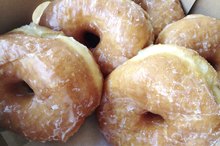Benefits of Natural, Fresh Ground Peanut Butter
The superior flavor and health benefits of simple, all natural, fresh ground peanut butter earn it a place in health food stores, specialty markets and some large grocery store chains. Fresh ground peanut butter provides you with healthy fats and energy needed to keep you moving all day. Because it's all natural, fresh ground peanut butter is free from any synthetic food additives or artificial ingredients.
Fresh Ground Benefits
Many food stores and specialty markets have self-serve machines where you make fresh ground peanut butter. In some cases, the store may use their nut butter grinder in the back and offer pre-packaged peanut butter in a deli case. Either way, the peanut butter was ground soon before you purchased it. This freshness of the peanut butter prevents the nut oils from spoiling or becoming rancid. Oils deteriorate when exposed to heat, light and oxygen. To preserve the quality and flavor of your peanut butter, keep it in a tightly sealed container in the refrigerator.
Natural Benefits
What Are the Benefits of Groundnut Oil?
Learn More
While the U.S. Food and Drug Administration does not have a set definition for the term "natural," it allows food companies to use the word to describe a product that contains no added colors, artificial flavors or synthetic ingredients. Many processed peanut butters found on store shelves contain added oils, salt and sugar. However, natural fresh ground peanut butter contains only peanuts and no other added ingredients. Peanuts are placed in the top of the mill machine and ground, using a small amount of heat, into a nut butter containing 100 percent peanuts.
Good Energy Source
Natural peanut butter is a healthy snack to sustain you between meals on a busy day. According to the U.S. Department of Agriculture, eating 2 tablespoons of this tasty nut butter gives you 188 calories, 8 grams of protein and 16 grams of fat. Fats and proteins digest more slowly than carbohydrates and linger in your stomach longer, which helps prevent hunger between meals. Try eating natural peanut butter on a sliced apple, banana, celery or whole-grain bread. But, be aware of your portion size when eating it as calories from peanut butter can add up fast.
Healthy Fats
Seasonal Allergy Symptoms - Chest Tightness & Pain
Learn More
According to the USDA, of the 16 grams of fat in a serving of peanut butter 12 grams come from monounsaturated and polyunsaturated fats. These two types of fat may help lower your cholesterol, decrease your risk of heart disease and improve blood sugar control, according to MayoClinic.com. In addition to being an excellent energy source, dietary fats play a role in absorption of the fat soluble vitamins A, D, E and K, maintenance of body cells and communication between cells.
Related Articles
References
- USDA Nutrient Data Laboratory: Nutrient Data for 16397, Peanut Butter, Chunk Style, Without Salt
- FDA: What is the Meaning of 'Natural' on the Label of a Food?
- MayoClinic.com: Dietary Fats: Know Which Types to Choose
- Linus Pauling Institute: What's Good About Dietary Fat?
- Understanding Food: Principles and Preparation; Amy Brown
Writer Bio
Erica Kannall is a registered dietitian and certified health/fitness specialist with the American College of Sports Medicine. She has worked in clinical nutrition, community health, fitness, health coaching, counseling and food service. She holds a Bachelor of Science in clinical dietetics and nutrition from the University of Pittsburgh.








